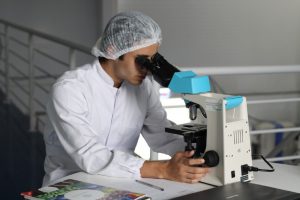University of Dundee researchers have discovered that a cancer drug can have long lasting effects by causing “catastrophic” DNA damage to tumour cells.
CDK4/6 inhibitors were recently licenced to treat the most common subtype of breast cancer due to their ability to stop cells dividing.
An important feature of the drug is its effects can last long after treatment has stopped, but the reasons for this were unclear.

A team led by Dr Adrian Saurin at the university’s school of medicine set out to clarify why the drug had long term effects.
Unexpectedly the team found that when CDK4/6 treatment ended cells started to divide again almost immediately but could not properly replicate their DNA when doing so.
This caused the tumour cells DNA to become damaged and abort division, stopping them growing altogether.
Dr Saurin and his colleagues believe this may help explain the drugs long term benefits in breast cancer patients.
Dr Saurin said: “These drugs work in a very general way to stop cancer cells dividing and so, in theory, they could also be beneficial for a wide variety of other tumour types.”
If this early-stage lab work is verified in patient samples then it raises the possibility of doctors being able to use the drug more effectively in the future treatment of breast and possibly other cancers.
Dr Saurin stated: “The fact that these drugs can cause catastrophic DNA damage was completely unknown and unexpected.
“Our results now need to be followed up in clinical samples, but if DNA damage is also found to occur in patient tumours then this would be very exciting because it may provide new ideas for treatment.
“Scientists have been racing to find out which other tumour types may respond to these drugs, and whether they should be used alone or in combination with other drugs.
“There are currently over 100 ongoing clinical trials to test all these questions, and our findings provide another potential avenue to explore as we attempt to discover the full potential of these inhibitors.”

